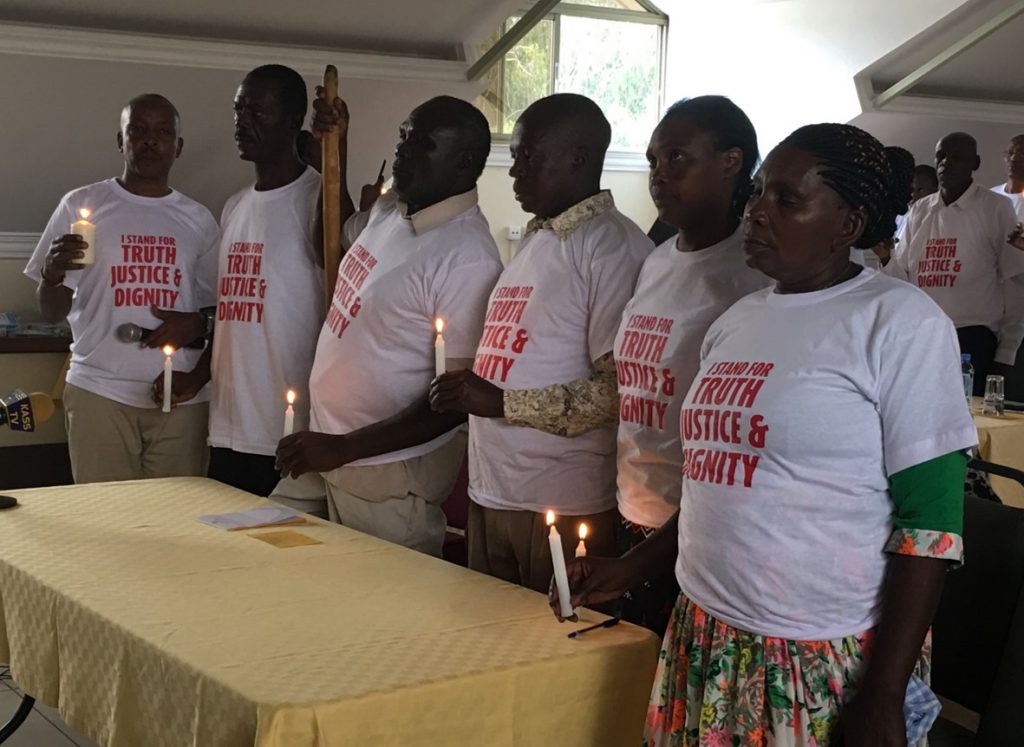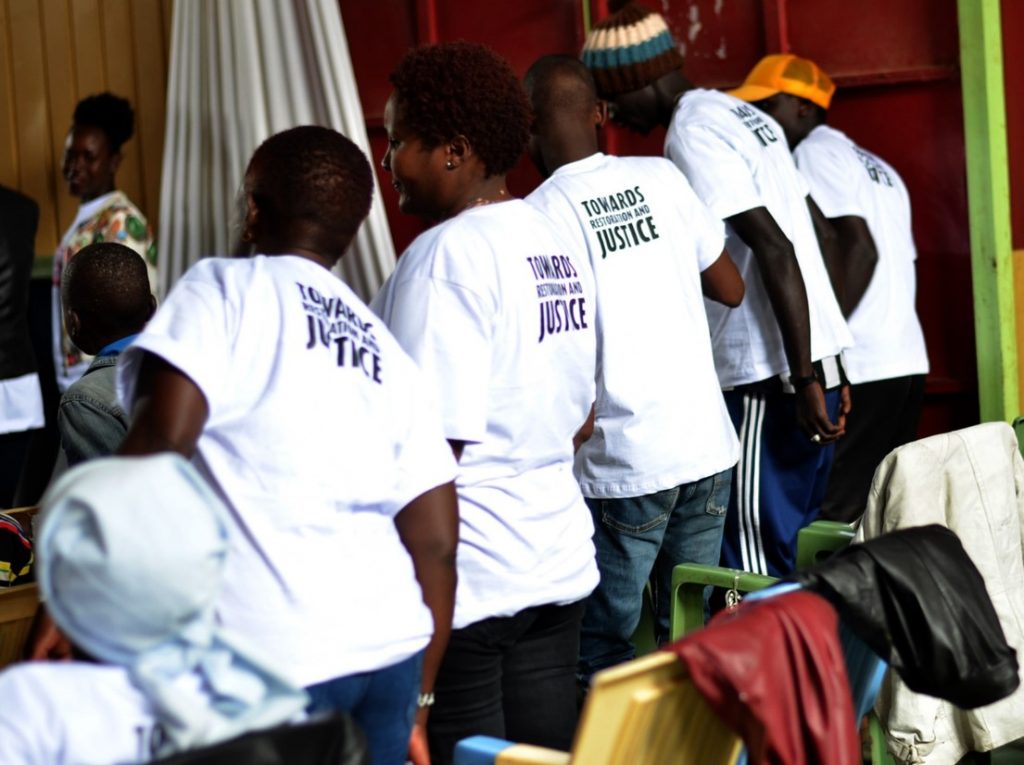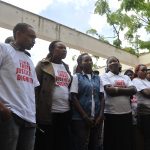Violence ripped through Kenya in the wake of the 2007 presidential elections, claiming more than 1,100 lives. Thousands more women, men, and children were raped or suffered other horrific forms sexual violence and brutality. Despite these abuses, there has been no accountability for these crimes, and, today, countless Kenyan survivors continue to live with severe physical and psychological consequences of the violence they endured.
An ongoing court case, however, aims to finally secure justice for the survivors. This high-profile litigation – officially known as Constitutional Petition No. 122 of 2013 – seeks to hold the Kenyan government accountable for sexual violence in the post-election period. The case was initiated on February 20, 2013, when six female and two male survivors filed Constitutional Petition No. 122 in the High Court in Nairobi. Four non-governmental organizations – the Coalition on Violence against Women, Physicians for Human Rights, the International Commission of Jurists-Kenya (ICJ-K), and the Independent Medico-Legal Unit – joined the suit as co-petitioners in the interest of the general public and many other survivors of election-related sexual violence who are not represented in the case. As the first of its kind after the 2007-08 election violence in Kenya, this closely-watched case has the potential to spur policy reforms that would improve the prevention of and medical-legal response to sexual violence, including better care for survivors and forensic documentation to support justice and reparations.
After years of delay, on December 10, 2020, in a landmark judgement, the High Court in Nairobi ruled in favor of four survivors of post-election sexual violence in Kenya. In Constitutional Petition No. 122 of 2013, the Court found that the Government of Kenya was responsible for a “failure to conduct independent and effective investigations and prosecutions of SGBV [sexual and gender-based violence]-related crimes during the post-election violence.” The decision was marred by the fact that the court recognized the harms endured by only four out of the eight survivor-petitioners.
Nearly one year later, a group of survivors of 2007-2008 election-related sexual violence in Kenya and civil society organizations filed a partial appeal, asserting that a High Court decision delivered on December 10, 2020 failed to recognize the Government of Kenya’s responsibility to survivors previously denied redress for the state’s failure to protect them from sexual violence perpetrated by non-state actors.
“Partial justice is an injustice. While [the 2020 judgement] was a milestone victory for survivors of sexual violence, we find that the High Court’s original ruling did not go nearly far enough to recognize the trauma experienced by four of the eight survivors, as well as the Government of Kenya’s legal obligation to prevent and respond to post-election sexual violence.”
Naitore Nyamu-Mathenge, LLM, MA, Kenya head of office at Physicians for Human Rights

Resources
Questions and Answers about the Constitutional Petition No. 122 of 2013
What happened in Kenya after the 2007 election?
Following the contested outcome of the presidential election held on December 27, 2007, violence (known widely as post-election violence (PEV)) swept the country into 2008, leading to murder, looting, destruction of property, and mass sexual violence. Sexual violence was committed in virtually every area where the PEV occurred – 6 out of 8 provinces. At least 900 individuals suffered sexual and gender-based violence, which was largely perpetrated by Kenyan security forces, as well as by gangs. Women and girls were disproportionately affected, but men and boys also endured sexual and gender-based violence. In many instances, those who were assaulted were abused in the presence of their children and spouses. Many survivors of violence were afraid to report violations to the authorities; others who tried were turned away. Very few cases were ever prosecuted, fueling a culture of impunity for perpetrators and continued suffering for survivors.
What is Constitutional Petition No. 122?
Constitutional Petition No. 122 of 2013, seeks to hold the Kenyan government accountable for failure to: prevent the violence and resulting sexual and gender-based violence; protect the general population, including survivors, from sexual assault; investigate and prosecute perpetrators of SGBV; and, provide prompt, adequate, appropriate and effective reparations to survivors. In it, the Petitioners claim that the government failed to properly train the police to protect them from violence; and sexual violence in particular. Further, the petitioners claim that following the PEV, police failed to properly investigate their claims. Also, failure to effectively document the crimes and gather evidence prevented effective prosecutions, thus leading to a miscarriage of justice for survivors of sexual violence. The petition also asserts that the government failed to provide reparations, including access to medical and psychosocial services.
Why was the petition filed?
Survivors of post-election violence waited for the Kenyan government to initiate thorough investigations until it became clear that there was no real political will to ensure their rights to credible and comprehensive redress. Despite enormous risk, in 2013 eight courageous survivors broke their silence and demanded action from the government of Kenya. In addition to the eight survivors (six women and two men) who suffered sexual violence during this period, the petitioners include Physicians for Human Rights, the Coalition on Violence Against Women, the International Commission of Jurists (ICJ-Kenya), and the Independent Medical-Legal Unit.
Who are the survivors who brought the case against the government?
The survivors in the case are six women and two men who suffered sexual violence during this time period. The eight petitioners are not the only survivors of the widespread and brutal acts of sexual violence perpetrated during the PEV. They are representative of more than 900 other victims, whose testimonies and reports were submitted to the Commission of Inquiry into the Post-Election Violence (CIPEV) in 2008, widely known as the Waki Commission Report, detailing gruesome incidents of individual and gang rape, defilement, forced circumcision, and other forms of sexual brutality. These violations resulted in severe physical injuries and detrimental psychological and socio-economic effects, among other serious health complications, that many survivors have borne over the last six years.
What are Kenya’s legal obligations to its civilians?
The petition is premised on the notion that the primary responsibility to protect citizens and provide redress when their rights are violated lies with each sovereign state. It is the government’s responsibility to protect civilians against sexual violence and ensure credible police investigations and prosecutions of these crimes. In this instance, the Government of Kenya bears legal responsibility – as outlined in the country’s constitution, as well as in international and regional human rights treaties adopted by Kenya –to enact and enforce laws, establish effective complaint mechanisms, and support justice processes that prohibit sexual violence. The Government of Kenya is obligated to promptly and impartially investigate, prosecute, and punish alleged perpetrators of sexual violence, and provide adequate compensation to survivors of these crimes. Moreover, whenever such violence occurs, the government must ensure that survivors have adequate access to medical services and psychological care.
What was the Court’s ruling?
In a landmark judgement in December 2020, the High Court in Nairobi ruled in favor of four of eight petitioners who are survivors of post-election sexual violence in Kenya. The Court found that, in those instances where state security officials sexually violated the survivor-petitioners or where a survivor-petitioner reported their case to the police and the police then failed to act, the Government of Kenya was responsible for a “failure to conduct independent and effective investigations and prosecutions of SGBV (sexual and gender-based violence)-related crimes during the post-election violence.” The four successful survivor-petitioners in the case were each awarded compensation of KES 4 million (approximately USD 35,000) “for the violation of their constitutional rights.” However, as of late 2021, the compensation has not yet been delivered.
Why was the ruling appealed?
On November 11, 2021, a group of survivors of 2007-2008 election-related sexual violence in Kenya and civil society organizations filed a partial appeal at the Court of Appeal at Nairobi, asserting that a High Court decision delivered on December 10, 2020 failed to recognize the Government of Kenya’s responsibility to survivors previously denied redress for the state’s failure to protect them from sexual violence perpetrated by non-state actors. The High Court decision was marred by the fact that the court recognized the harms endured by only four out of the eight survivor-petitioners – because these survivors had been either sexually assaulted by state security forces or had reported to the police but the police had failed to investigate. Physicians for Human Rights (PHR), an appellant in this case, along with our co-petitioners, argued that the Kenyan government remains responsible for protecting individuals from human rights violations, regardless of the perpetrators’ affiliation, and that its failure to demonstrate due diligence in preventing, investigating, and redressing such acts of sexual violence made it liable.
The appellants also seek to hold the state accountable for failing to prevent or respond to post-election sexual violence perpetrated by ethnic militias and civilians – a risk of violence that was widely anticipated. The Court of Appeals heard the appeal on February 4, 2025.
The Court has scheduled judgment for April 11, 2025, marking a significant step in this nearly 17-year-long pursuit of justice. The Court of Appeal has a critical opportunity to deliver justice to the four survivor petitioners and clearly affirm that the Government of Kenya has a duty of care to protect the public, perpetrators of sexual violence will be investigated and prosecuted, and survivors have a right to access to reparations and remedy.

Key Documents and Related Resources
Legal Documentation
PHR Resources
Factsheets
Statements
- Joint Statement: After 13 Years of Delays, Four Survivors of Post-Election Sexual Violence Finally Receive Compensation from Government of Kenya (July 18, 2025)
- Kenyan Court Delays Justice for Survivors of Post-Election Sexual Violence (April 11, 2025)
- Survivors of Post-Election Sexual Violence in Kenya Appeal Elements of Recent Ruling, Seek Justice and Redress for All Survivor-Petitioners (November, 2021)
- Court Delivers Justice for Several Survivors of Post-Election Sexual Violence in Kenya (December, 2020)
- Kenya’s Judicial System Is Failing Survivors of Post-Election Sexual Violence (September, 2019)
- PHR Statement on Post-Election Developments in Kenya (August, 2017)
Reports
- Breaking Cycles of Violence: Gaps in Prevention of and Response to Electoral-Related Sexual Violence in Kenya (December 2019)
Blog posts
- A Final Chance at Justice for Survivors of Post-election Sexual Violence in Kenya (December 2020)
- What’s Next for Kenya? (September 2017)
Journal articles
Multimedia

